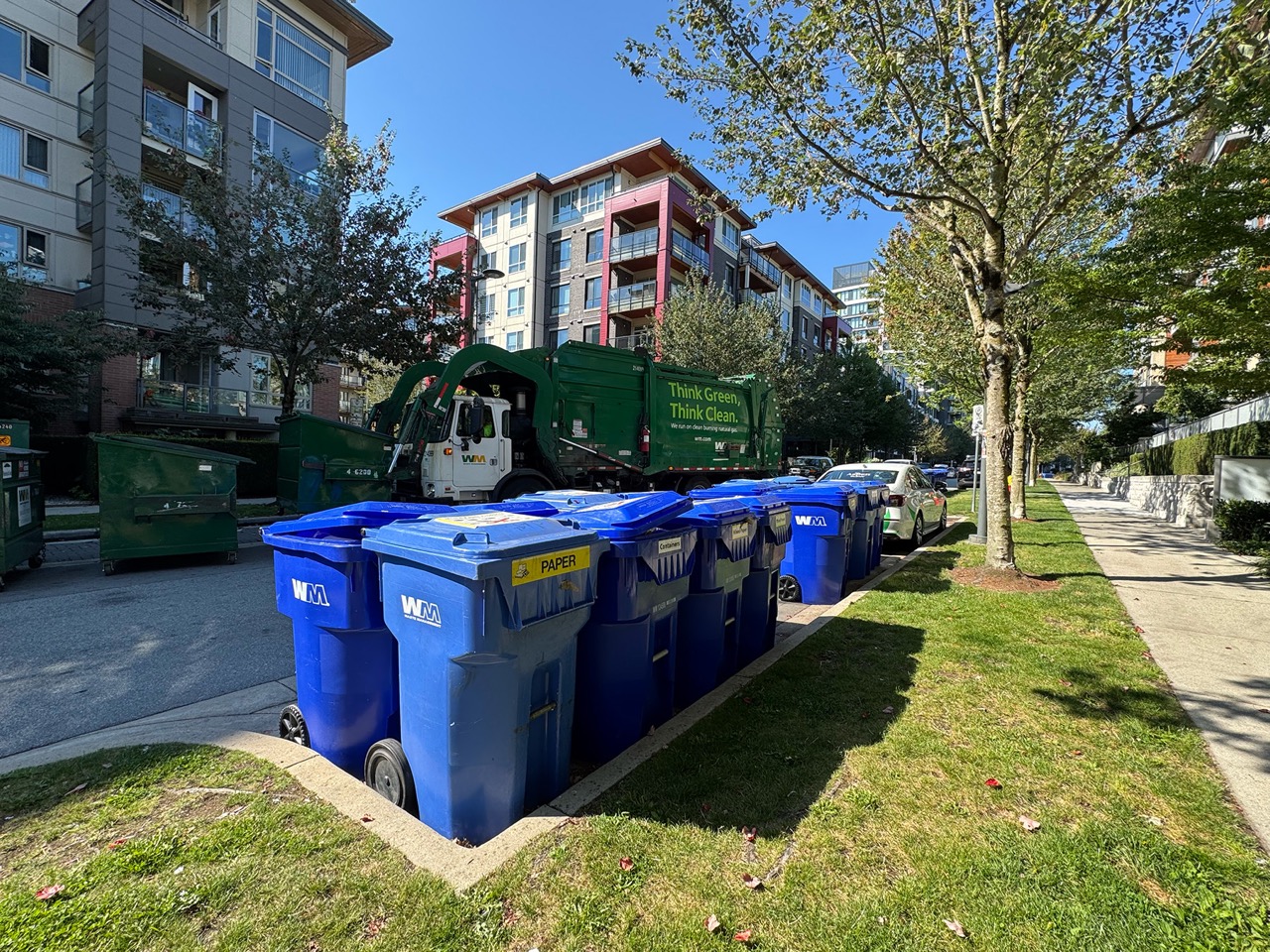The process is simple.
Here in the university neighbourhoods, waste is disposed of in the garbage rooms of residential buildings; large blue containers are used for recycling paper, containers and cardboard, and green organic waste bins help to divert waste away from landfills.
This is common knowledge for many, but recent statistics show waste diversion efforts may be weakening. The truth is, it’s hard to tell exactly how well waste diversion efforts are faring, due to a lack of data.
Recycling rates among residents in multi-family buildings in Metro Vancouver reached a peak in 2020, with almost 40 per cent of people successfully dividing their trash.
But according to a Metro Vancouver Recycling and Solid Waste Management report, the rate has been decreasing slightly to below 35 per cent.
Recycling rates in single-family homes are much higher and currently at above 60 per cent. This makes an average recycling rate of about 50 per cent among all Metro Vancouver residents.
Metro Vancouver’s official target for waste diversion is 80 per cent – a wide gap.
Compared to statistics from 2010, waste generation has dropped by 14 per cent within 13 years – missing a stated target of 20 per cent.
So how are we doing in the university neighbourhoods?
It’s hard to paint a complete picture as the UNA does not collect data on residential waste production. “We do not have any information on residential waste data, as we do not collect or have access to this data,” said Wegland Sit, the Operations Manager at the UNA.
The most recent recycling rate for the UBC Vancouver campus is from the 2013/2014 reporting period and states campus-wide initiatives were able to divert 61 per cent of overall waste from landfills. UBC’s sustainability office was not available to provide more up-to-date numbers.
Sit says waste management is decentralized in the UNA and that each residential building in the area independently hires a waste hauler.
That is why you might sometimes see the garbage truck passing by your building even though the trash bins of your building aren’t being picked up on that day.
“A consistent area-wide pickup schedule is challenging due to the unique characteristics of each building, such as the physical layout of recycling rooms, the number of units, and the mix of household types, and finally their own waste hauler service schedule,” Sit says.
The most recent data on waste generation in the UNA is from a 2010 waste audit. That audit found that 90 per cent of the daily waste generated in the UNA was recyclable or consisted of organic matter. And a 2017 research project by Ivana Zelenika – then a UBC PhD candidate in resource management and sustainability – stated that “there is a tremendous opportunity to mobilize more effective residential participation in recycling and composting” within the neighbourhoods of the UNA.
Wesbrook Village’s Green Depot is helping in those efforts.
The Green Depot is managed by the UNA and provides campus residents not only with the option to participate in the circular economy but also with a marketplace where a diverse range of items including clothes and books are available free of charge.
UNA’s Green Depot, in addition to the above, offers to recycle soft and flexible plastics. These are plastics that don’t go into your residential container trash. Soft plastics include plastic bags, Ziploc bags, and bubble wrap, and flexible plastics include chip bags, can rings, and candy wrappers.
The Green Depot works together with waste management companies, like Westcoast Plastic Recycling Inc., which picks up full bins of plastics for recycling. Recycled soft plastics are condensed and processed into new plastics, while flexible plastics are incinerated to create electricity.
Data from the UNA shows the depot is keeping a lot of waste from entering landfills.
According to a 2024 sustainability report prepared by UNA staff, the Green Depot recycled 3640 kilograms of items dropped off in August 2024, which is 2,055 kilograms more than the amount of waste that was diverted in August 2023.
JAN SCHUERMANN HAS LIVED IN GERMANY, POLAND, AND THE U.S. BEFORE MOVING TO CANADA. HIS CAREER EVOLVED FROM WRITING FINANCIAL NEWS IN FRANKFURT TO COVERING BREAKING NEWS IN VANCOUVER FOR CITYNEWS AND THE CAMPUS RESIDENT. HE IS PASSIONATE ABOUT FINDING THE STORIES BEHIND THE STORIES.
